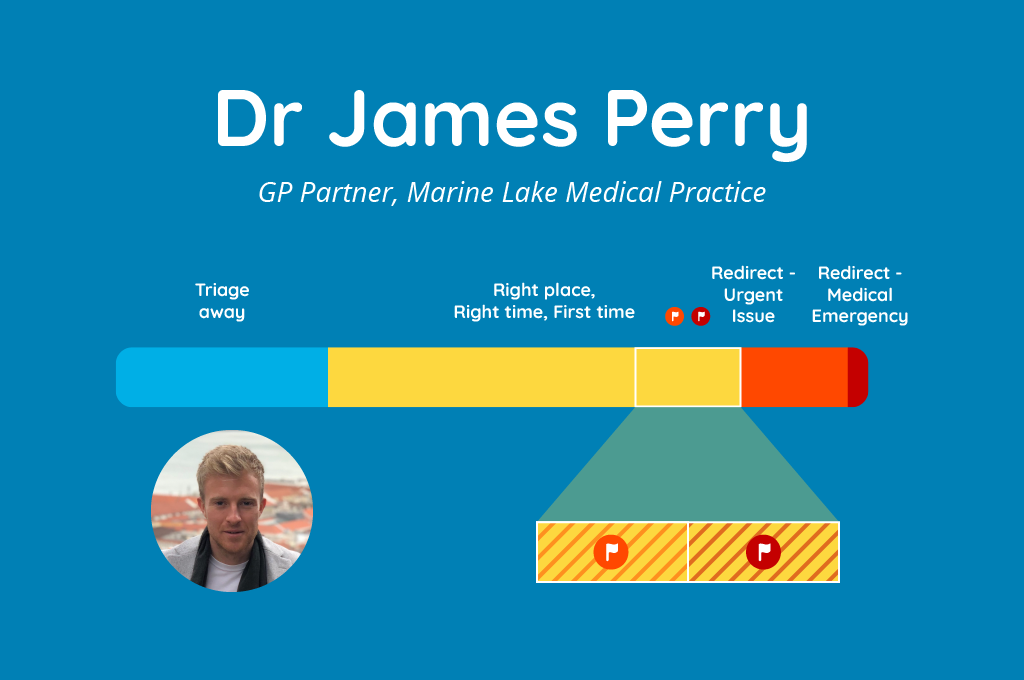Dr James Perry: How we’ve introduced clinician efficiency with eConsult

The two most important things you should look for from your online consultation provider are:
- Whether it can safely help you care navigate patients to the right service or appointment type without further data gathering.
- Adding efficiency to the working day, not leading to increased or unnecessary patient contacts.
My practice, Marine Lake Medical Practice on The Wirral, Merseyside looks after over 19,500 patients. Our list size contains ‘over the national average’ number of patients over the age of 65 and yet our patients have fully embraced online consultations, proving that we shouldn’t make assumptions about our patients based solely on age.
We have a full complement of staff that help run the practice, including 16 GPs, a nurse practitioner, eight practice nurses, four healthcare assistants and multiple administrative staff (including a dedicated triage team of care navigators and a separate team of data gatherers).
We’ve been using eConsult since March 2020 and over that time we’ve evolved and changed how we use the platform to optimise our efficiency. The built-in safety features that eConsult have are fundamental to our way of working.
Every practice is able to use eConsult as they wish internally, but in conjunction with eConsult our practice has developed a ‘gold standard’ system that was presented at the RCGP conference and shared with practices wishing to better cope with patient demand and efficiency. We’re now managing roughly 3,000 eConsult submissions per month. In particular, we’re taking full advantage of eConsult’s growing clinical review template offerings to make managing our patients with long term conditions easier and safer.
eConsult’s structure allows us to triage patients better
Triaging our patients’ needs and wants allows us to better allocate our clinical time and resources. eConsult is a structured online consultation system that asks the right questions – the questions that a GP would ask their patients.
This might mean it takes patients a little bit of time to complete, but it gives us a direct understanding of the patient’s symptoms, as well as their concerns and expectations. It’s been developed to asynchronously gather the information required to make an educated decision regarding the next step in a patient’s journey.
Detailed information from the patient presented in a structured manner allows us to better care navigate. We’ve consistently found that 30% of our patients are streamed to more appropriate community services or are managed quickly by a GP without using a traditional appointment when using eConsult to triage (that’s around 900 appointments per month saved!).
For patients that do need time with a clinician, we’re able to book them into the right acuity slot type, with the correct health care professional, in the right format (face to face, video, or telephone).
The questions and flags eConsult assigns to a patient means a risk assessment can be made quickly and with confidence. The red and amber flagging icons give us an indication of responses that we need to focus on, as they may impact timescales or management decisions. These are small tools that are invaluable to better triage.
We find that about 10% of patients who try to use the eConsult platform actually require urgent attention. eConsult detects urgent symptoms and stops the submission of an eConsult. Instead, they are signposted to seek more immediate care, either by calling the practice or NHS 111 out of hours. This means they are dealt with in a timely manner and reduces the potential for them to become unwell whilst waiting for their eConsult to be assessed.
Very few patients, around 0.4% are redirected to emergency services while trying to use the eConsult platform. If they are describing life-threatening symptoms, they need more urgent care than we, the practice, can provide without putting their health at risk.
How structured questions make patient journeys safer
We do hear some patients complaining that eConsult asks a lot of questions, but those questions are present for good reason; the safety of patients. The templates allow us to assess risk quickly due to the familiar questions and flow of questioning eConsult presents to us.
As an eConsult user, regardless of the volume of patient submissions received, I can be assured that patients with the most urgent symptoms are not waiting for their GP to respond to an online request. I would not trust that a disclaimer statement is enough to educate patients about worrying/urgent symptoms; patients don’t always recognise the potential implication/urgency of the symptoms they’re experiencing.
eConsult allows us to safely and efficiently navigate patients to the right clinician or service at the first time of asking. I wouldn’t get that level of reassurance from an unstructured online consultation platform. I would have to contact patients again (adding in inefficient and use of GP time) before making a clinical decision as I wouldn’t know if they had any red flag or clinically concerning features.
Dr James Perry is a GP Partner. He is Senior Responsible Office for Urgent Pre-Hospital care on the Wirral and also works for the NIHR Central Research Network (North West Coast) as a Deputy Lead for Primary Care research. Dr Perry developed a keen interest in triage models, technology and improving efficient working during the Covid-19 pandemic. He approached eConsult after seeing his practice uptake of this product surge; he wanted to learn more about how he could improve his practice’s performance using digital tools. He now works with eConsult in their clinical development team to support customers with demand management.
What next?
Want to speak to our team about how eConsult could help your practice?